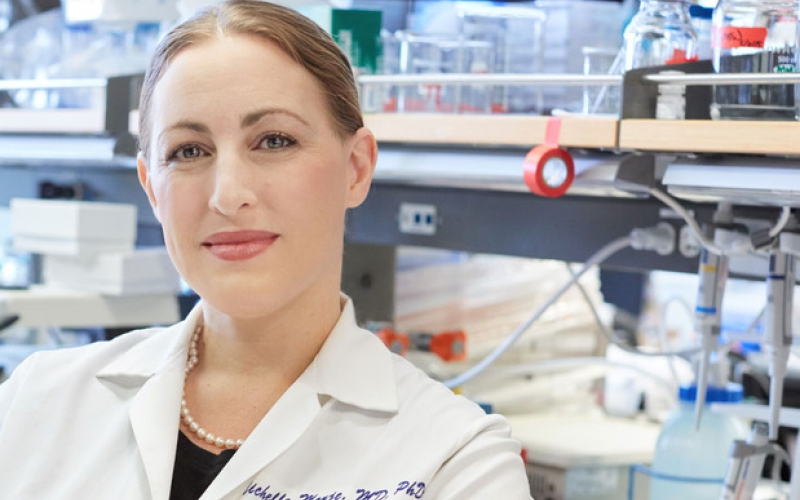
By: Trish Adkins
When COVID-19 forced all but essential employees to work from home, childhood cancer researchers were faced with the same shutdown. Dr. Michelle Monje, an Alex’s Lemonade Stand Foundation (ALSF)-funded researcher who studies high-grade gliomas, had less than 12 hours to shut down her lab when California put shelter-in-place orders in effect on March 16.
Dr. Monje and her team scrambled to save the things they could not lose—like primary cell cultures from children’s tumors and backed up all data to hard drives. Her lab is open again, but with restrictions and social distancing guidelines in place.
Across the country in Boston, Dr. Steven Dubois’ lab at Dana Farber Cancer Institute experienced a similar emergency shutdown.
With research interrupted, experiments in the lab stopped, which then in turn impacted the pace of pushing experiments out of the lab and into the clinical trial phase.
“This is a three-month shutdown, that will lead to a six-month lag,” said Dr. Dubois.
However, as labs reopen and adjust to new guidelines, childhood cancer researchers remain dedicated to pushing towards safer treatments and cures for children. To continue to reach that goal, researchers rely on the support of ALSF.
Here are 4 ways the COVID-19 pandemic impacted childhood cancer research and how you can help:
1. Researchers pivoted from lab work to “home” work.
After Dr. Monje’s lab shutdown and her team was sent home, they had every reason to take a break. However, they also had even bigger reasons to keep progressing forward. Her team pivoted from lab research and used the time for data analysis, research paper writing and also to push two new clinical trials forward.
How you can help: Learn more about the Childhood Cancer Data Lab (CCDL), an initiative of ALSF. THE CCDL develops tools and training programs to empower childhood cancer researchers to utilize vast amounts of data to make more robust discoveries and cures, faster and cheaper.
2. Clinical Trial enrollment was threatened.
Traveling to reach a clinical trial is hard enough for families facing a cancer diagnosis. Add a pandemic to the mix and travel becomes downright daunting. The pandemic lowered new clinical trial enrollments. Patients enrolled in current trials continued treatment—sometimes at the clinic site and other times locally, with their trial doctor coordinating with the local medical team.
“We didn’t stop clinical trials. They are the cornerstone of what we do,” said Dr. Dubois.
However, with patients receiving treatment at secondary locations and hospital visits limited by pandemic hospital protocols some of the information gathering could have been compromised.
“One goal of a trial is to learn as much as possible from every child that’s on trial, meaning getting extra blood samples, tumor material, surveys, questionnaires to learn as much as possible,” said Dr. Dubois. “Those additional surveys and blood draws had to be shut down.”
How you can help: Support the financial needs of families as they travel for treatment through the Travel For Care program. In the Spring, ALSF launched the COVID-19 emergency fund, which extended Travel For Care benefits by supporting families with grocery store gift cards and care packages.
3. The new generation of cancer researchers could be at risk.
For young investigators, just at the start of their careers, the COVID crisis puts an enormous financial burden on labs. New labs are like start-up businesses and finances can be extremely tight. Once those labs shut down, young researchers were put in shaky financial situations.
“We are at a real risk of losing an entire generation of cancer researchers,” said Dr. Monje.
How you can help: Learn more about the Young Investigator Grants research program and how early-career grants can help power careers that lead to breakthroughs. Join the One Cup at a Time Club to make a monthly donation that can help sustain the research grants program now and tomorrow.
4. Like every school and business, research labs struggled with how to return to work and be safe.
Oncology research labs are now back at limited capacities, with rotating schedules and distancing guidelines put in place. Researchers are focused on regaining the momentum they had before the shutdown—because children with cancer need cures.
How you can help: Continue on in the virtual, safe spirit by joining the End Childhood Cancer 5K – Halloween Edition, a virtual event that supports childhood cancer research for all children.

